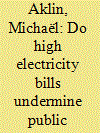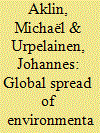|
|
|
Sort Order |
|
|
|
Items / Page
|
|
|
|
|
|
|
| Srl | Item |
| 1 |
ID:
179703


|
|
|
|
|
| Summary/Abstract |
The clean energy transition has long been framed in terms of its technological and economic feasibility. An increasingly salient constraint lies in its political feasibility. The transition requires vigorous public support to be completed. Yet increased consumer costs associated with the deployment of renewable electricity could make voters - and, by extension, governments - less supportive of it. As a result, overly aggressive government support for renewables could lead to its own downfall. To examine this threat, I document two stylized facts. First, the expansion of renewable electricity capacity has been followed by an increase in household electricity bills, and this has mostly happened because of energy-specific taxes. An increase of renewable electricity capacity by one within-country standard deviation raises a typical household's bill by €5.7 per MWh (95% CI: [3, 8.3]), most of which comes from an increase in non-VAT taxes (+€3.8/MWh [2.6; 5.1]). Second, these taxes have hurt popular support for aggressive renewable energy policy. An increase of non-VAT taxes by one standard deviation increases the share of people who find renewable energy too ambitious by 0.7 percentage points (95% CI: [0.1; 1.3]). Climbing costs could therefore undermine further political support toward renewable electricity deployment and threaten its contribution to greenhouse gas reductions.
|
|
|
|
|
|
|
|
|
|
|
|
|
|
|
|
| 2 |
ID:
136611


|
|
|
|
|
| Summary/Abstract |
Environmental ministries have become increasingly common, but the determinants of their global spread remain only partially understood. We develop a theory of domestic–international interactions in the global adoption of environmental ministries. We argue that domestic factors can sensitize a country to different types of international influence: foreign pressure, external support for capacity building, and learning effects. Empirically, we examine the global spread of environmental ministries, 1960–2009. We find that countries have strong incentives to establish environmental ministries when they are undergoing a democratic transition and environmental problems are salient at the international level. In other words, the democratization of a country allows international factors to promote the formation of a national environmental ministry. The findings contribute to the study of domestic–international linkages and help understand global trends in environmental governance during a period of unprecedented environmental destruction.
|
|
|
|
|
|
|
|
|
|
|
|
|
|
|
|
| 3 |
ID:
179702


|
|
|
|
|
| Summary/Abstract |
As household electrification rates continue to increase globally, the focus in energy access planning is increasingly shifting towards quality of service. To inform this planning, we explore changes in household electricity and people's use and satisfaction with their service over time in rural India. Fielded in 2015, the ACCESS survey collected data on energy access from more than 8,500 households living across six Indian states. In 2018, the same households were re-surveyed. Using this longitudinal dataset, we sketch the changes in electricity access that took place during these three years. We find that access and the quality of supply have both improved substantially, with a 17 percentage points increase in electrification rates (95% CI: [15,19]). However, a large minority (about one fifth) remains unsatisfied with its electricity access. People's satisfaction levels were more sensitive to the quality of supply in 2018 compared to 2015. We propose that this change is a result of evolving expectations of electricity services that are offered. As households climb electricity access tiers and acquire more and larger electric appliances (such as fans or TVs), their demands increasingly shift from focusing on the extensive margin of supply to its intensive margin.
|
|
|
|
|
|
|
|
|
|
|
|
|
|
|
|
| 4 |
ID:
165431


|
|
|
|
|
| Summary/Abstract |
Do international lenders of last resort create financial instability by generating moral hazard? The evidence is thin and plagued with measurement error. We use the number of American troops hosted by third countries to measure the strength of American commitment to ensuring the countries’ economic health. We test several hypotheses against a dataset covering about sixty-eight countries between 1960 and 2009. Using evidence from fixed-effects and instrumental-variable models, we find that increasing the number of US troops by one standard deviation above the mean raises the probability of a financial crisis in the host country by up to 13 percentage points. We also investigate the channels through which moral hazard materializes. Countries with more US troops conduct more expansionary fiscal and monetary policies, implement riskier financial regulations, and receive more capital, especially from US banks. While many scholars of international relations view the American overseas military presence as a source of stability, we identify an underexplored mechanism by which it generates instability.
|
|
|
|
|
|
|
|
|
|
|
|
|
|
|
|
|
|
|
|
|